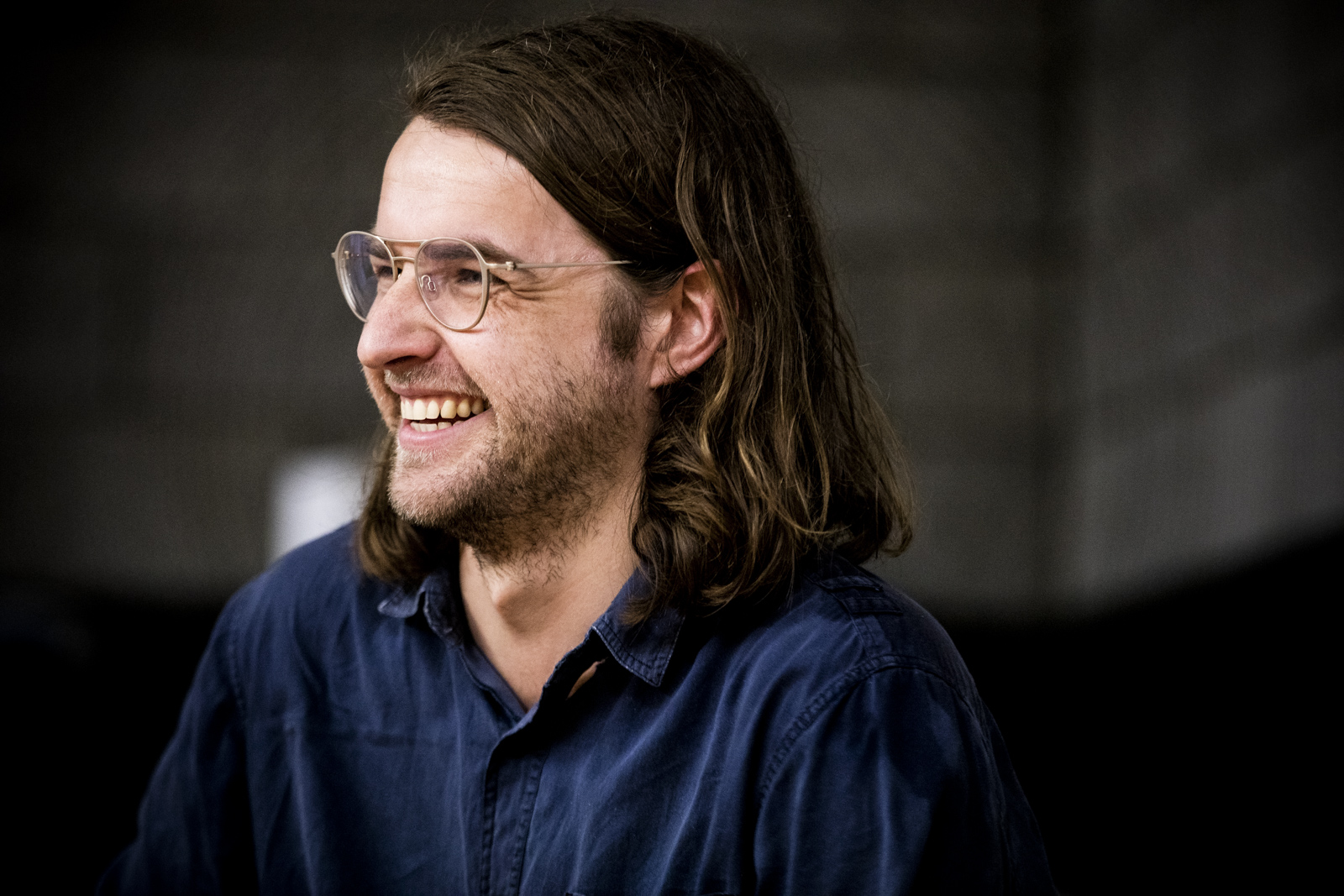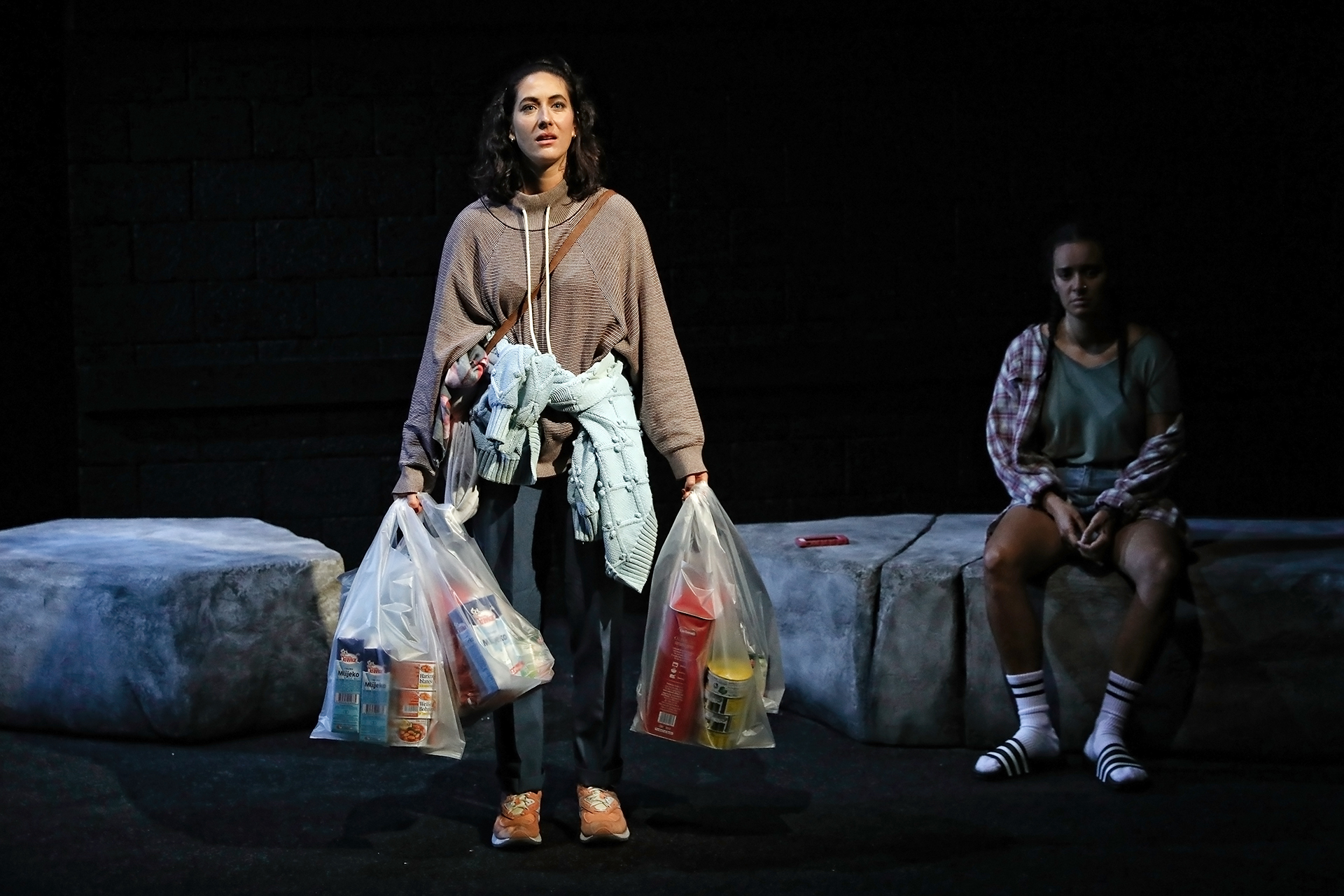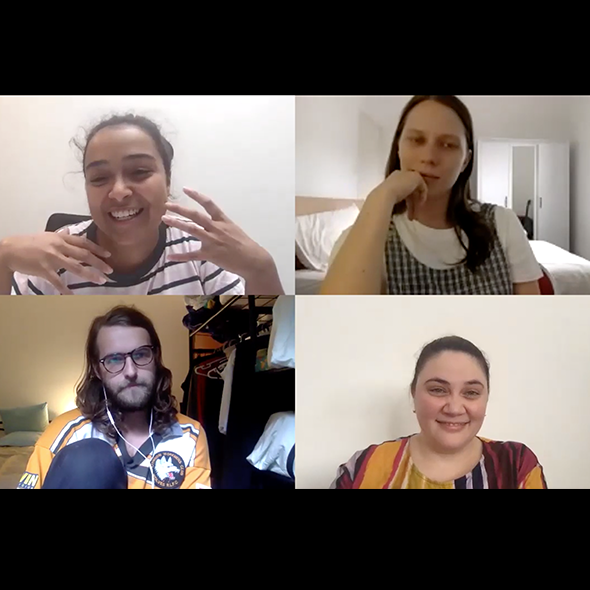28.10.20
Mark Rogers is the multi-award-winning playwright behind Superheroes, which finishes its season on Saturday 31 October. To reflect on the play and its premiere production, Mark sat down with the Griffin team and had a yarn, which has been transcribed here for your reading pleasure!
Content Warning: this interview contains references to suicide.
When I began writing Superheroes, initially, I didn’t have a plan at all.
It was just an experiment—I started writing monologues. I had written a couple of plays with sociopathic male leads that were very dialogue-y, plot-ty plays, and I wanted to do something different. So I set myself an exploratory task of writing monologues—writing a different, more prose-like form. One of the monologues was a woman in a backyard in south western Sydney, and another one was a woman in Mostar, Bosnia, watching Slobodan Praliak commit suicide on live TV with her family. There were other ones as well… one with weird twins—I was just writing stuff! But after a while, it started to feel like the one in Bosnia and the one in south western Sydney started to chime or echo each other… and from there, quite quickly, those two monologues became the germination of this play.

I think quite formally when I’m writing—form is the thing I get most excited about. When I’m conceiving plays, often, form is the thing that comes early on in the process. Story and character come later, sometimes I only get them in my re-writes. But this time, I knew quite early that the play would be these two monologues in concert, with a third figure, a bloke, who would link the two narratives, until eventually I would try to get the two female characters in the one room at the end… a kind of ‘vase-shaped’ play! I had no idea how I would go about making a ‘vase-shaped’ play, or what the story would be, so first drafts consisted of me writing to try and find what that might look like.
The cool thing about writing plays is that they give you clues to what you’re meant to do.
As you’re writing them, they tell you what to do… but when I put something down, I’m a skilled enough reader of other work, of other plays, that I have a sense of what might happen in my own. From there, you follow your nose and look at what you’re telling yourself. Another part of it is what you want to say about the world, too. My partner and I were expecting our first child when I was writing the initial draft of Superheroes, so I was thinking a lot about what it means to bring new life into the world, and what that is as a form of responsibility. I was also thinking about how something like that might connect to larger ideas of responsibility—me as a father, but also me as a citizen of the world. Having those ideas in mind acted like a kind of guiding force that helps you follow your nose through the play.
The first drafts of the play I wrote before I had Edith, my daughter, and the draft that I submitted to all the playwriting awards I had written in about a day when Edith was sleeping, in the first month of her being alive. So I guess it was a baby trauma kind of play too!
It’s also a slice-of-life, one-day-on-earth play. The play begins when Jana’s watching TV with her family in the morning, and ends when Jana’s watching TV again with her family at night. I made a rule for myself, that Jana would have to be utterly different by the time that she completed her timeline. For Emily, my impulse initially was to have her make a huge decision that she has to follow through on. That ended up changing a bit in Emily’s narrative.

My plays are very much set in the ‘real world’—at least, Superheroes and the next couple are.
I quite like writing stuff that is set within the rules of reality; that’s set in real places with real street names. I get a kick out of doing that. Not to say that one day I won’t write an amazing sci-fi play, but for now, I’m quite interested in sticking to the minutiae of a setting. I do Google Maps research—I’ll go in and find where on earth my characters actually are, and map their movements. That also gives me prompts for plot and narrative: I’ll think to myself, “Ok, she’s there, and I want her to go to the markets here… so where would she cross?”. Then I look at the map and think “Oh, ok! She crosses the old bridge!”, which is actually a scene in the play. I enjoy trying to write in the real world. Even though the play is not formally trying to convince the audience that it’s real, I like that the story, the events of the play, adhere to reality.
In terms of research, I’m very much a ‘keep-Google-open-when-writing’ kind of guy. I’m a big magpie—I steal little bits and phrases from the research I do. Often if I’m stuck, if I can’t quite crack the next line of the play, I’ll jump over to my research quickly and then jump back into the play—doing that often gives me the little prompt I need. For Superheroes, the research I did, especially for Jana’s thread of the narrative, was a lot more considerable than usual. My research started when I saw the Praliak suicide video, as well as my creative relationship with Sanja Simic, who’s a director with a similar kind of background to the character of Jana. Jana is me imagining what Sanja would be like if she stayed in Bosnia, and didn’t come to Australia. I had a relationship to the ethnic-religious tensions in that part of the world through Sanja, and also through this Daniel Keene play Because You Are Mine, which was directed by a mentor of mine, Tim Maddock, at Red Shed a million years ago. Tim gave me that play when I was studying at uni, and it was one of those moments where I was like “Woah. Playwriting. This play.” Both of those things made me attracted to the idea of writing that world, and my research process was really about filling all the gaps in my knowledge about Bosnia. The research consisted of watching documentaries, delving into books, getting in contact with some of Sanja’s family to get some sense of what the reaction to the Praliak video was over in Bosnia…
I’ve written other shows where the research component formed a big part of the work—I wrote a work called Plastic, which was about fraud in science—that was a big research task too. I took a deep dive into the histories of a lot of people who had faked their research. Research is always fun and exciting for me—I’m a nerd, and I like learning things. So research and playwriting is always concurrent for me.
A real gift in writing Superheroes was that I had such a long development period.
I enjoyed three weeks with Shari [Sebbens, Director] and Declan [Greene, Dramaturg] and some amazing actors where we really dug into the play. If I hadn’t have had that development period, the play still would have been the play, but it also would have been 3000 words longer, a bloated mess, quite confused… but by the time we started rehearsal, the play was pretty bulletproof. There were things to fix, but it wasn’t a chaotic mess. The play wouldn’t have been as engaging, wouldn’t have been as tight. It would have been a big poetry-fest, where Emily spent all her time at the mall, and nothing would have happened!

To try and prevent over-writing, I set a little rule for myself. The rule was that my characters couldn’t talk about the past, and they weren’t allowed to say how they feel. They were only allowed to describe what they were doing and what they were thinking. I wanted to avoid that academic impulse where you write the same line three times, or spend a hundred million years detailing an interesting thought that I’d had—I just wanted to keep it in the present. Especially in Emily’s narrative early on, nothing was happening, really. For so long of her narrative, the play was just her waiting to talk to Simon. There was something kind of beautiful about that, but it was also dead as hell, in terms of theatricality. It would have been better to read… like, she’s gone to Gloria Jeans, now she’s worried about being at Gloria Jeans because someone might think she’s a homophobe… and then the beach scene happened and that was all. So I’m so stoked with where Emily’s story went—it feels like a much more acute portrait of a family. Discovering that in the workshop of the play, with the actors, and Shari and Declan, was such a joy.
For me, it’s interesting to think about the use of specificity in songwriting.
The greater specificity you have in songwriting, weirdly, the more universal that song is. When you hear Paul Kelly listing where he is on the bus—St Kilda to Kings Cross—that echoes. I have a different relationship with that song because I know those places, but someone else might not, they might interpret it differently. I have relationships with songs by The Pogues, for example, where I’ve never been to any of the places they mention, but the effect of someone talking about a particular street provides me with a sense of universality in its specificity, as opposed to writing something with no detail so it can be applicable to every context.
As well as playwriting, I also play in bands. It’s been a big part of my life since forever. I played with my friends at high school, and wrote my first songs there, and then most of my friends from high school went to Melbourne to play music. Meanwhile I went to Wollongong to do theatre. But I still played in my friends’ bands, and we’ve been doing that forever. I played in a band called The Ocean Party for a long time, and now I play in a band called Pop Filter with most of the same people. It’s a very different type of creativity to making plays because it’s less considered, it’s a lot more off the cuff, it’s a lot looser—and that’s its virtue. Plays are things that I spend years on, and you hone and hone them until they’re really great, and they’re doing what you want them to do. What I like about music, or writing songs, is that feeling of “Yeah, that’ll do”. That song reflects where I was at that particular point in time, or on that day.
I’ve also got a big relationship to listening to music as well—all my favourite songwriters are great lyricists, and really writerly. I draw a lot of inspiration from songs and other artists. My top tier of writers is made up of songwriters, and then below that are the playwrights and poets. Music is a different type of art form, but it’s time-based in the same way that theatre is. It’s just that songs are four minutes long, or two minutes long, and plays are 70 minutes long, or two hours long. You can also learn a lot about dynamics by listening to songs, too: “Where’s the loud bit?”; “What’s the short bit?”. There’s also something about verse-chorus-verse that is really satisfying, too. You can tell I’m into form!
The forms of different songs are really inspiring to me. Music’s great at doing something that feels super fucking meaningful, but you don’t have the borders for why it feels super fucking meaningful. I think lyricists are really good at finding details that somehow feel really true, but you don’t know why. It just gets you. I like seeking those moments out a lot. For Superheroes, there’s this line from one of my favourite songs ever, it’s a Gareth Liddiard song, The Radicalisation of D, from his album Strange Tourist—he’s the songwriter in The Drones and Tropical Fuckstorm—the last song on his album is 16 minutes long, and it’s about David Hicks… there’s a line in there which is stupidly detailed, and I don’t know why this line in a song about an Australian terrorist gets me, but he says “He finds 5 valiums in a Winfield pack, in a duffel bag in the hall”, and I love that sense of zooming out. The zoom out is so sublime to me. Something about the craft of that line knocked me sideways in a big way, and a lot of the construction of Superheroes was me picking out bits from that song.
Your playwriting voice is the stuff that you like in everybody else’s stuff. Whatever having a ‘voice’ as a writer means, how you pull together the stuff you like is the thing that ends up being uniquely ‘you’. I try to be sensitive to that. Whether I’m watching film or reading the newspaper or looking at art, I interrogate what ‘gets’ me about whatever I’m experiencing—then that often finds its way into my own work.
Superheroes wraps up at the Seymour Centre on Saturday 31 October. There are a handful of tickets left—book now to catch this wonderful new Australian play!

